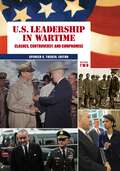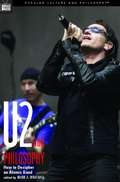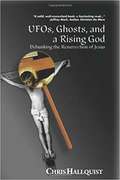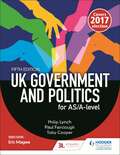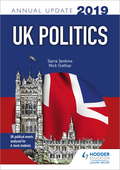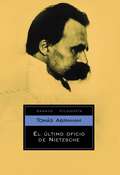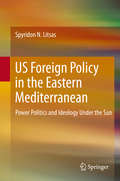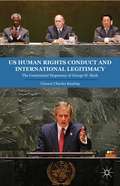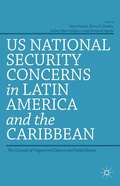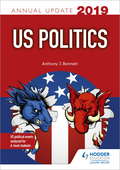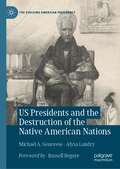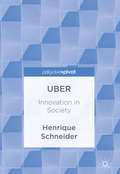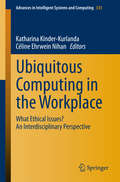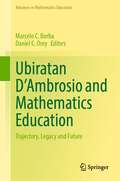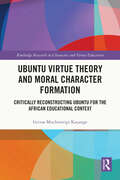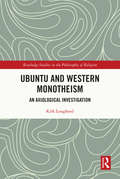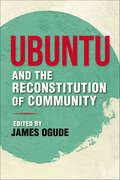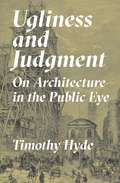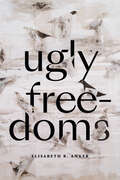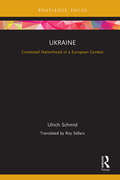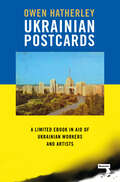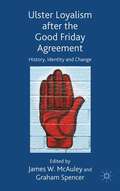- Table View
- List View
U.S. Leadership in Wartime: Volume 1
by Spencer TuckerNow from one of the world's leading publishers of military history comes a breakthrough book on one of the most important and complex aspects of U.S. national defense. U.S. Leadership in Wartime: Clashes, Controversy, and Compromise offers a comprehensive analysis of the characteristics that constitute effective leadership in war and discusses the often contentious relationships between U.S. civilian and military leadership throughout American history.
U.s. Leadership in Wartime: Volume 2
by Spencer TuckerPresident Harry S. Truman's 1951 firing of Douglas MacArthur ended the nation's most famous showdown between a commander in chief and a high-profile officer--but it was far from the only time a chief executive and a general clashed.
U2 and Philosophy: How to Decipher an Atomic Band
by Mark A. WrathallIs it possible to be a committed Christian and a rock superstar? Can political activists make good music? Do hugely successful rock bands really care about AIDS and poverty in Africa, or is it just another image-enhancing schtick?<P><P> U2 and Philosophy ponders these and other seeming dichotomies in the career of the Irish supergroup. For over two decades, U2 has been one of the biggest acts in rock music. They've produced over a dozen platinum and multiplatinum records and won 15 Grammy Awards. Critics everywhere have praised the band's thoughtful, complex lyrics and the artistry of their music. At the same time, Bono, the group's lead singer, has dedicated himself to political and social causes, blurring the line between rock star and respected statesman. Offering fresh insight into the band's music and activism, these thought-provoking essays allows fans to discover philosophy through the eyes of U2, and rediscover U2 through the eyes of philosophers.
UFOs, Ghosts, And A Rising God: Debunking The Resurrection Of Jesus
by Christopher HallquistAt the dawn of the 21st century, interest in the origins of Christianity is as strong as ever. However, discussion tends to be dominated by Evangelicals who assume that the Bible is a historically accurate record, and those who would turn Jesus into a New Age guru. There is also a frequent insistence that the questions surrounding the origins of Christianity are beyond rational analysis. In UFOs, Ghosts, and a Rising God, Chris Hallquist examines what investigations of similar upstart cults have revealed, and then applies these revelations to the origins of the world's largest religion.
UK Government and Politics for AS/A-level (Fifth Edition)
by Paul Fairclough Philip Lynch Toby CooperExam Board: AQA, Edexcel, OCR & WJECLevel: A-levelSubject: PoliticsFirst Teaching: September 2017First Exam: June 2018Inspire political thinking with our bestselling politics textbook and help students get their best grade with political commentary and analysis; , fully updated the new 2017 specifications and including coverage of the June 2017 general election results.Covering key topics for all exam boards, this textbook puts politics in context with topical analysis of politics today and how UK governmental and political history shaped current events and thinking.- Extend knowledge and improve key skills with comprehensive coverage and analysis of relevant political developments, including the 2017 snap election, possible consequences of Brexit, and its effect on Scottish independence- Understand how different topics within the A-level link together with the new Synoptic Links feature- Develop key analysis and evaluation skills with activities and case studies throughout the textbook - look out for Debate, Case Study and Activity boxes- Clarify knowledge and understanding of political language with summaries and explanations of key terms- Test and develop understanding of key topics with exam focus sections tailored to the new Politics specifications
UK Politics Annual Update 2019
by Sarra Jenkins Nick Gallop- Review all the key developments in UK politics from the last year, with expert analysis you can draw on both throughout your course and in the exams- Go beyond your textbooks to build a bank of up-to-date examples and data, helping you developknowledgeable and persuasive arguments- Know how to hit the highest grades with guidance from experienced teachers and authors Sarra Jenkins and Nick Gallop
ULTIMO OFICIO DE NIETZSCHE, EL (EBOOK)
by Tomas AbrahamUn oficio es un modo de pensar la vida, y Nietzsche fue un filosofo con varios oficios. Este libro circular y bicéfalo lo expone el fracaso del primer oficio de Nietzsche y el desencadenamiento de los que siguieron, hasta llegar al ultimo secreto, y volver así al testimonio del primero. En la primera parte, el ensayo de Tomas Abraham traza el diagrama de los oficios en relación con los amores de Nietzsche, que fueron pocos pero cruciales. La presencia diabólica de Wagner -su pater seraficus-, la de Lou Andreas-Salome, que lo rechazo y comprendió con inteligencia piadosa y distante, la de Paúl Ree, que lo libero de su pasión pastoral. Todos estos amores atravesaron su abra. El autor dedica especial atención al amor mas importante de todos, porque fue depredatorio e histórico: el de su hermana. En la segunda parte de editan en su totalidad los artículos de combate en torno a El nacimiento de la tragedia, el libro que dividió las aguas de los oficios. Esta edición -completa, con un riguroso trabajo filosófico y un estudio preliminar de German Sucar- es un trofeo añorado desde hace años por los seguidores de Nietzsche y los amantes de la filosofía. Nietzsche es un filosofo que piensa contra si mismo llevado por la fuerza de una lucidez cruel e inestable. Su pensamiento es una radiación que se expande con la fuerza de la adversidad. Por eso Nietzsche es actual, por que exhibe la pasión del pensar en su irrefrenable camino de crear nuevos espacios y en su repulsa a dejarse domesticar por interpretaciones in vitro. La filosofía de Nietzsche no es un sistema, es el canto de un filosofo solidario que sigue siendo nuestra gran compañía. Por eso este libro: para volver a escuchar esa voz.
US Foreign Policy in the Eastern Mediterranean: Power Politics and Ideology Under the Sun
by Spyridon N. LitsasThis book examines US foreign policy in the Eastern Mediterranean and the region’s key role in the practice and evolution of American exceptionalism. The political developments in the Eastern Mediterranean during the 19th and the first half of the 20th centuries, gave to the US opportunities to express, in the most explicit way, its anti-colonialism, the fervent support of open and democratic societies, and its willingness to openly confront tyranny and oppression whenever this was possible (or necessary) for American interests. Since that time, the region has been a testing ground for the core elements of American foreign policy deployed worldwide. The monograph shows the contributions of the United States during critical moments in the region, such as the First Barbary War (1801-1805), the introduction of Truman Doctrine, Washington’s role in the Suez Crisis, the Greek junta and the Imia Crisis of 1996. It also scrutinizes the different levels of the economic, military and diplomatic challenges which China, Russia and Turkey present today, while it also covers the American approach to the Arab Spring. From a ‘Shining City on a Hill’ to the current ‘Make America Great Again’ mottoes, this critique follows American Foreign Policy in the Eastern Mediterranean and the strong bonds that the nation established with the geostrategic, political and ideological features of the region. The pace of recent events, and the increasing complexity of this global corner, prove a challenge to America today; the future and clarion call that hard work and the finest ingenuity are necessary to keep its regional hegemony, and its course toward increased prosperity. This work’s goal is to inspire the conversations by academics, diplomats, leaders (both political and military) and most of all businessmen, to this end.
US Human Rights Conduct and International Legitimacy
by Vincent Charles KeatingWas the Bush administration was successful in legitimating its preferences with habeas corpus, torture, and extraordinary rendition? As American transforms in the post-Bush era, scholars have begun to assess the post-9/11 period in American foreign and domestic policy, asking difficult questions regarding torture and human rights.
US National Security Concerns in Latin America and the Caribbean
by Harry E. Vanden Gary Prevost Carlos Oliva Campos Luis Fernando AyerbeThe concepts of 'ungoverned spaces' and 'failed states' where the limited presence of the state is seen as a challenge to global security have generated a rich intellectual debate in recent years. In this edited volume, scholars from Latin America and the United States will analyze how US foreign policy making circles have applied the concepts to the creation of new US security initiatives in the Latin American region during the post September 11, 2001 era. The extension of concepts to Latin America has been significant because it has meant that during the past thirteen years US policy in the Hemisphere has shifted away from the primarily economic emphasis of the 1990s, the era of the Free Trade Area of the Americas project, back to a security focus reminiscent of the Cold War era. The last decade has witnessed a significant increase in US military presence in the region highlighted by the re-launching of the Caribbean-based Fourth Fleet, the militarization of drug fighting efforts in Mexico, and the establishment of several new military bases in Colombia, the staunchest US ally in the region.
US Politics Annual Update 2019
by Anthony J Bennett-Review all the key developments in US politics from the last year, with expert analysis you can draw on both throughout your course and in the exams-Go beyond your textbooks to build a bank of up-to-date examples and data, helping you develop knowledgeable and persuasive arguments-Know how to hit the highest grades with guidance from experienced teacher and author, Anthony J. BennettChapters include:-The 2018 midterm elections-The Trump presidency after two years-The Brett Kavanaugh nomination-Where does power reside in Congress today?Anthony J. Bennett has taught, examined and written on US politics for many years. He is the author of US Government and Politics for A-level (now in its fifth edition) and is an editor of Politics Review.
US Presidents and Cold War Nuclear Diplomacy (The Evolving American Presidency)
by Joseph M. Siracusa Aiden WarrenThis book will illustrate that despite the variations of nuclear tensions during the Cold War period—from nuclear inception, to mass proliferation, to arms control treaties and détente, through to an intensification and “reasonable” conclusion (the INF Treaty and START being case points)—the “lessons” over the last decade are quickly being unlearned. Given debates surrounding the emerging “new Cold War,” the deterioration of relations between Russia and the United States, and the concurrent challenges being made by key nuclear states in obfuscating arms control mechanisms, this book attempts to provide a much needed revisit into US presidential foreign policy during the Cold War. Across nine chapters, the monograph traces the United States’ nuclear diplomacy and Presidential strategic thought, transitioning across the early period of Cold War arms racing through to the era’s defining conclusion. It will reveal that notwithstanding the heightened periods when great power conflict seemed imminent, arms control fora and seminal agreements were able to be devised, implemented, and provided a needed base in bringing down the specter of a cataclysmic nuclear war, as well as improving bilateral relations. This volume will be of great interest to scholars and students of American foreign policy, diplomatic history, security studies and international relations.
US Presidents and the Destruction of the Native American Nations (The Evolving American Presidency)
by Michael A. Genovese Alysa LandryThis book examines how the United States government, through the lens of presidential leadership, has tried to come to grips with the many and complex issues pertaining to relations with Indigenous peoples, who occupied the land long before the Europeans arrived. The historical relationship between the US government and Native American communities reflects many of the core contradictions and difficulties the new nation faced as it tried to establish itself as a legitimate government and fend off rival European powers, including separation of powers, the role of Westward expansion and Manifest Destiny, and the relationship between diplomacy and war in the making of the United States. The authors’ analysis touches on all US presidents from George Washington to Donald Trump, with sections devoted to each president. Ultimately, they consider what historical and contemporary relations between the government and native peoples reveal about who we are and how we operate as a nation.
Uber
by Henrique SchneiderThis book employs a variety of economic and philosophical methodologies in order to discover the philosophical implications of creative destruction, competition regulation, and the role that businesses or market agents play. Instead of discussing these relations in a purely abstract manner, Schneider uses Uber to illuminate important matters in economic and philosophical thought. Schneider tells the following story: While creative destruction and disruptive innovation change the entrepreneurial landscape, regulation--especially the regulation of sectorial markets and competition regulation-- delay this change or even bring it to a halt. Uber, as an agent in the market, is not just an object moved by these two opposing forces, but plays an active role--first as an agent of creative destruction and then in championing regulations on their terms.
Ubiquitous Computing in the Workplace: What Ethical Issues? An Interdisciplinary Perspective (Advances in Intelligent Systems and Computing #333)
by Katharina Kinder-Kurlanda Céline Ehrwein NihanThis book provides an interdisciplinary collection of views on the ethical challenges and opportunities of workplaces in the Internet of things. Current developments within Ubiquitous computing (ubicomp) systems designed for the workplace are introduced and philosophical, organizational and socio-ethical considerations of ubicomp in workplaces are provided. Suggestions regarding the rules that should be respected in order to favor an adequate implementation of ubicomp in the workplace are offered, considering both intra-organizational but also wider societal concerns. The interdisciplinary collection of contributions invites the reader to engage in the discussion of ubicomp in everyday working environments.
Ubiratan D’Ambrosio and Mathematics Education: Trajectory, Legacy and Future (Advances in Mathematics Education)
by Marcelo C. Borba Daniel C. OreyThis edited volume is written in memoriam of Professor Emeritus Ubiratan D’Ambrosio (1932 – 2021), who was a well-known Brazilian mathematics educator and historian of mathematics. This book explores the diverse facets of D’Ambrosio’s work as well as his legacy and the later adaptation of his ideas around the globe.It starts with a preface written by his son, Alexandre D' Ambrosio, who shares his personal experiences growing up with this father and his love for discovery. The book is then divided into four sections:Past and Future: Ubi’s Way of Seeing Education in the PresentRoots of EthnomathematicsEthnomathematics in ActionTrends in Ethnomathematics It features diverse points of view and experiences that explore mathematics and culture from researchers in the Americas, Africa, Europe and South Asia. Chapters range from personal explorations of D’Ambrosio’s impact to broader views of his research and work. This book forms part of the growing understanding of Ubiratan D’Ambrosio’s life, research, and the legacy he has left for millions of researchers, students and teachers worldwide. This book is appealing to anyone involved in mathematics education research as well as those interested in the history and future of mathematics education.
Ubuntu Ethics: Human Dignity, Moral Perfectionism, and Needs (Routledge Studies in African Philosophy)
by Motsamai MolefeThis book provides a philosophical exposition of Ubuntu ethics, which it does by explaining the saying ‘a person is a person through other persons’. Written by one of the world’s leading scholars of African philosophy, the book first argues that the focus on umuntu (or, a person) in Ubuntu ethics as intrinsically valuable makes ethical humanism and human dignity vitally important. The book then goes on to consider the role of virtue ethics in driving an ideal of moral perfectionism. This, in turn, provides the basis for what a good society should be: a needs-based political theory. Providing an important guide through Ubuntu ethics as a moral system constructed in terms of moral perfectionism, it will be an important read for researchers of African philosophy, and of the philosophy of virtue ethics and moral perfectionism more generally.
Ubuntu Virtue Theory and Moral Character Formation: Critically Reconstructing Ubuntu for the African Educational Context (Routledge Research in Character and Virtue Education)
by Grivas Muchineripi KayangeThis book investigates the ubuntu theory-based conception of virtue and moral character formation in the northern, western, and eastern regions of Africa, suggesting a critical reconstruction of ubuntu by conceptualising the four different forms of practices in moral character formation. Arguing for the critical reconstruction of ubuntu virtue theory as more nuanced than simply the standard ubuntu normative virtue theories (which give priority to the community as the sole locus for understanding virtues and character formation in Africa), the book builds a comprehensive model of virtue and moral character formation that draws insights from the reconstructed notion of ubuntu and other theories within and beyond the African thought. Chapters feature experience from across Africa including Malawi, Zambia, Zimbabwe, Uganda, Kenya, and South Africa, and centre on topics such as traditional cultural views and practices, political systems in various nations, neoliberalist thought, and primary, secondary and tertiary education systems in Africa and further afield. This is a valuable resource for scholars, academics, and postgraduate students, working in the fields of moral and values education, philosophy of education, and the theory of education more broadly. Those also interested in educational psychology may also find the volume of interest.
Ubuntu and Western Monotheism: An Axiological Investigation (Routledge Studies in the Philosophy of Religion)
by Kirk LougheedThis book offers a unique comparative study of ubuntu, a dominant ethical theory in African philosophy, and western monotheism. It is the first book to bring ubuntu to bear on the axiology of theism debate in contemporary analytic philosophy of religion. A large motivating force behind this book is to explore the extent to which there is intersubjective ethical agreement and disagreement between ubuntu and Western worldviews like monotheism and naturalism. First, the author assesses the various arguments for anti-theism and pro-theism on the assumption that ubuntu is true. Ubuntu’s communitarian focus might be so different from the Western tradition that it completely changes how we evaluate theism and atheism. Second, the author assesses the advantages and disadvantages of the truth of ubuntu for the world. Third and finally, he assesses the axiological status of faith for both monotheism and ubuntu. Ubuntu and Western Monotheism will be of interest to scholars and advanced students specializing in philosophy of religion, African religion and philosophy, and religious ethics.
Ubuntu and the Reconstitution of Community (World Philosophies)
by Edited by James OgudeUbuntu is premised on the ethical belief that an individual's humanity is fostered in a network of human relationships: I am because you are; we are because you are. The essays in this lively volume elevate the debate about ubuntu beyond the buzzword it has become, especially within South African religious and political contexts. The seasoned scholars and younger voices gathered here grapple with a range of challenges that ubuntu puts forward. They break down its history and analyze its intellectual surroundings in African philosophical traditions, European modernism, religious contexts, and human rights discourses. The discussion embraces questions about what it means to be human and to be a part of a community, giving attention to moments of loss and fragmentation in postcolonial modernity, to come to a more meaningful definition of belonging in a globalizing world. Taken together, these essays offer a rich understanding of ubuntu in all of its complexity and reflect on a value system rooted in the everyday practices of ordinary people in their daily encounters with churches, schools, and other social institutions.
Ugliness and Judgment: On Architecture in the Public Eye
by Timothy HydeA novel interpretation of architecture, ugliness, and the social consequences of aesthetic judgmentWhen buildings are deemed ugly, what are the consequences? In Ugliness and Judgment, Timothy Hyde considers the role of aesthetic judgment—and its concern for ugliness—in architectural debates and their resulting social effects across three centuries of British architectural history. From eighteenth-century ideas about Stonehenge to Prince Charles’s opinions about the National Gallery, Hyde uncovers a new story of aesthetic judgment, where arguments about architectural ugliness do not pertain solely to buildings or assessments of style, but intrude into other spheres of civil society.Hyde explores how accidental and willful conditions of ugliness—including the gothic revival Houses of Parliament, the brutalist concrete of the South Bank, and the historicist novelty of Number One Poultry—have been debated in parliamentary committees, courtrooms, and public inquiries. He recounts how architects such as Christopher Wren, John Soane, James Stirling, and Ludwig Mies van der Rohe have been summoned by tribunals of aesthetic judgment. With his novel scrutiny of lawsuits for libel, changing paradigms of nuisance law, and conventions of monarchical privilege, he shows how aesthetic judgments have become entangled in wider assessments of art, science, religion, political economy, and the state.Moving beyond superficialities of taste in order to see how architectural improprieties enable architecture to participate in social transformations, Ugliness and Judgment sheds new light on the role of aesthetic measurement in our world.
Ugly Freedoms
by Elisabeth R. AnkerIn Ugly Freedoms Elisabeth R. Anker reckons with the complex legacy of freedom offered by liberal American democracy, outlining how the emphasis of individual liberty has always been entangled with white supremacy, settler colonialism, climate destruction, economic exploitation, and patriarchy. These “ugly freedoms” legitimate the right to exploit and subjugate others. At the same time, Anker locates an unexpected second type of ugly freedom in practices and situations often dismissed as demeaning, offensive, gross, and ineffectual but that provide sources of emancipatory potential. She analyzes both types of ugly freedom at work in a number of texts and locations, from political theory, art, and film to food, toxic dumps, and multispecies interactions. Whether examining how Kara Walker’s sugar sculpture A Subtlety, Or the Marvelous Sugar Baby reveals the importance of sugar plantations to liberal thought or how the impoverished neighborhoods in The Wire blunt neoliberalism’s violence, Anker shifts our perspective of freedom by contesting its idealized expressions and expanding the visions for what freedom can look like, who can exercise it, and how to build a world free from domination.
Ukraine: Contested Nationhood in a European Context (Europa Country Perspectives)
by Ulrich SchmidUkraine: Contested Nationhood in a European Context challenges the common view that Ukraine is a country split between a pro-European West and a pro-Russian East. The volume navigates the complicated cultural history of Ukraine and highlights the importance of regional traditions for an understanding of the current political situation. A key feature is the different politics of memory that prevail in each region, such as the Soviet past being presented as either a foreign occupation or a benign socialist project. The pluralistic culture of Ukraine (in terms of languages, national legacies and religions) forms a nation that faces both internal and external challenges. In order to address this fully, rather than following a merely chronological order, this book examines different interpretations of Ukrainian nationhood that have been especially influential, such as the Russian tradition, the Habsburg past and the Polish connections. Finally, the book analyses Ukraine’s political and economic options for the future. Can the desired integration into EU structures overcome the concentration of investment of power in the hands of a few oligarchs and a continuing widespread culture of corruption? Will proposals to join NATO, which garnered robust support among the populace in the aftermath of the Russian aggression, materialise under the current circumstances? Is the political culture in Ukraine sufficiently functional to guarantee democratic procedures and the rule of law?
Ukrainian Postcards: A Limited Ebook in Aid of Ukrainian Workers and Artists
by Owen HatherleyAn ebook on the threatened built environment of urban Ukraine, with all proceeds going to the CWU's Ukraine fund and Artists at Risk.This is a short, limited edition ebook, with all proceeds being divided between the Communication Workers Union's Humanitarian Fund for Ukraine, and Artists at Risk's Ukraine appeal. Today, during Russia's imperialist war on Ukraine, everyone is talking about this large, beautiful and multicultural country, but, when doing so, they're often repeating some poorly understood cliches and myths. Ukrainian Postcards, written firmly from the political left, draws on the author's writings on the modern architecture of various Ukrainian cities, written between 2010 and 2020, to build up a picture of a country that could one day be a model of how to live with a difficult past and a multicultural present - but which has been consistently undermined by politicians who use it as a cashbox and, above all, a neighbour who uses it as punchbag.Above all, at a time when Ukraine's architectural heritage is literally under threat — shelled and bombed by the Russian air force, day-in-day-out — it outlines just how valuable and special this country's buildings are, and how much we stand to lose with their destruction.
Ulster Loyalism after the Good Friday Agreement
by Graham Spencer James W. McauleyA timely assessment of loyalist history, identity and community in Northern Ireland today which provides a comprehensive picture of how loyalism has reacted to changes since the Good Friday Agreement. Challenging simplistic stereotypes of loyalism this book provides a complex multi-faceted explanation of the loyalist imagination.
